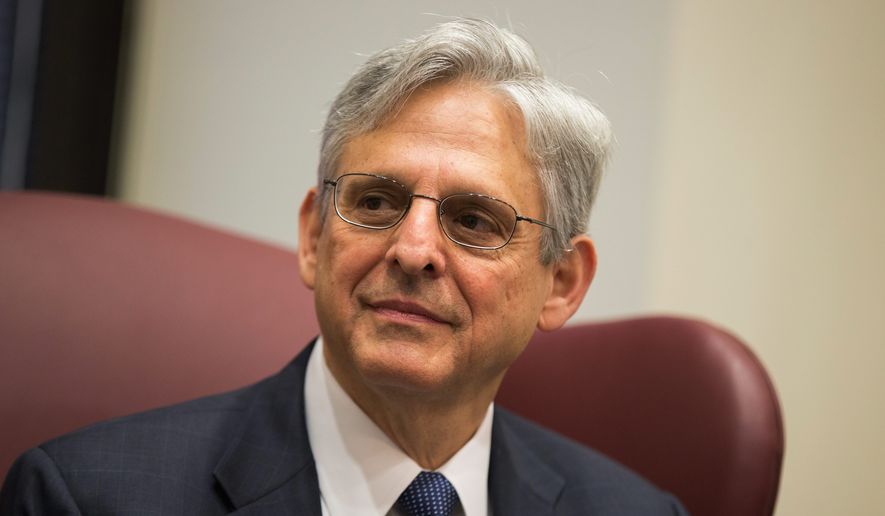President Obama criticized Senate Republicans Tuesday for allowing the Supreme Court to begin its new term with one vacant seat, and the White House addressed the vacancy’s potential impact on the presidential election if the results were thrown into court.
“In a city of self-inflicted wounds, this one is more dangerous and less defensible than most,” Mr. Obama wrote in the Huffington Post. “This is about the obstruction of a broken Republican-led Congress.”
Mr. Obama nominated Judge Merrick Garland to the high court 202 days ago to fill the vacancy created by the death of Justice Antonin Scalia. But Senate Republicans have refused to hold a confirmation hearing or a vote, saying the next president should choose a nominee.
In the meantime, the Court opened its new term this week ideologically split 4-4 between its conservative and liberal wings.
At the White House press briefing, reporters raised the questions of whether the Court would be unable to weigh in on the presidential election if needed, as it did in 2000 when justices ruled that a recount in Florida should be halted.
White House press secretary Josh Earnest said “it’s hard to speculate at this point what sort of role the Supreme Court could have” on the election. But he said Mr. Obama is “deeply concerned” in general about the impact of the vacancy.
Mr. Earnest said of Judge Garland, “His treatment by Republicans in the United States Senate has been terrible.”
Senate Majority Leader Mitch McConnell, Kentucky Republican, has ruled out voting on the Garland nomination in a lame-duck session after the election. Mr. Earnest said the president still hopes that Judge Garland eventually will get a hearing.
“The president is hopeful that there will be a course correction implemented,” Mr. Earnest said. “Probably not under Leader McConnell’s watch; he’s the one that’s broken the system.”
McConnell aide Don Stewart noted that Mr. Obama, while a senator in 2005, led a filibuster against the nomination of eventual Supreme Court Justice Samuel Alito Jr.
“It is accurate to say that Leader McConnell believes the American people should be heard and that the next president will make the nomination to fill this vacancy,” Mr. Stewart said. “But since Josh [Earnest] knows that his boss was one of the first ever to filibuster a Supreme Court nominee, it takes a creative imagination to say what he said today.”
Sen. Michael Bennet, Colorado Democrat, said the Republicans are taking a “radical departure” from the Constitution by blocking the nomination in an election year.
“The majority’s refusal to even consider Judge Garland’s nomination is the most egregious example of Washington dysfunction I have seen,” Mr. Bennet said on the Senate floor last week. “The majority’s failure to fulfill our constitutional responsibilities isn’t even about policy, it is about politics. It is about rolling the dice on an election, instead of following the plain text of the Constitution and more than two centuries of Senate tradition in the history of the United States.”
Sen. Jeff Flake, Arizona Republican, is among those who don’t dispute that partisan politics is the primary cause of the impasse.
“Our position shouldn’t be that the next president ought to decide,” he said of Senate Republicans. “Nobody really believes that, because if this were the last year of a Republican presidency, nobody would say that.”
He told the Daily Beast, “Our position ought to be to confirm the most conservative justice to replace Scalia — to maintain the balance on the Court. That ought to be the principle, and that would allow for us to go with Garland if the alternative is somebody more liberal.”
In his op-ed, Mr. Obama said the nomination is just one example of how congressional Republicans “have traded progress for partisanship.”
“Republican leaders in Congress have proven they won’t work with my administration, but along the way, they’ve lost sight of their basic mission,” Mr. Obama wrote. “They can’t even meet their own goals. Republicans say they care about good paying jobs, but they’re ignoring one of the best ways to create them by refusing to make long overdue investments rebuilding our roads, bridges, ports and airports. They can’t move the ball forward on tax reform, one of the GOP’s biggest priorities, and they continue to delay serious funding to combat an opioid epidemic that has devastated the lives of many of their constituents. They talk a great deal about poverty, but refuse to address it in a meaningful way.”
• Dave Boyer can be reached at dboyer@washingtontimes.com.




Please read our comment policy before commenting.